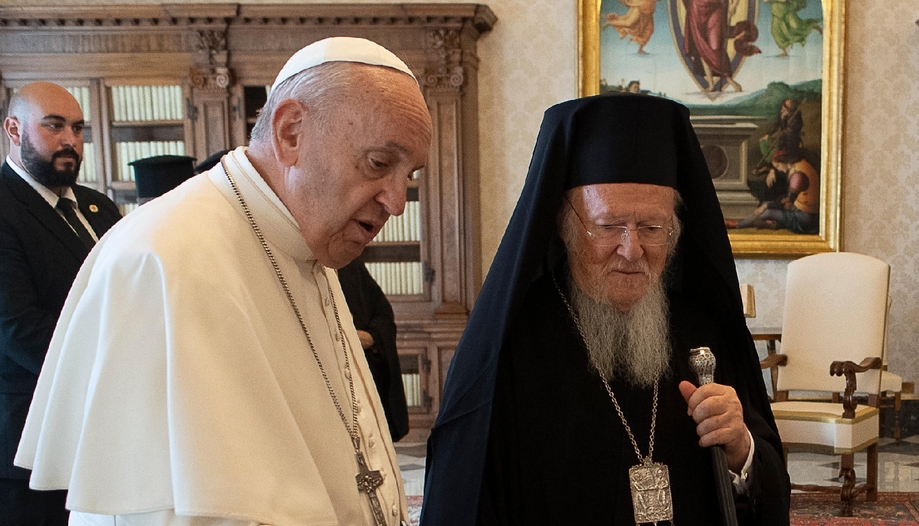The primacy of the Pope has always been one of the greatest obstacles on the road to the full unity of the Christian Churches. The ecumenical dialogue is moving forward and is now in the process ofhe Dicastery for the Promotion of Christian Unity has published a study document, "The Bishop of Rome. Primacy and synodality in ecumenical dialogues and responses to the encyclical Ut unum sint'".The first edition of the book, with the approval of Pope Francis, summarizes for the first time the responses to the encyclical of Saint John Paul II and ecumenical dialogues on the question of primacy and synodality.
The document concludes with a proposal from the Dicastery that identifies the most significant suggestions put forward for a renewed exercise of the Bishop of Rome's ministry of unity "recognized by one and all."
"The aim of the document," said the Prefect of the Dicastery, Cardinal Kurt Koch, "is to offer an objective synthesis of recent developments in the ecumenical discussion reflecting the insights and limitations of the dialogue documents and a brief proposal from the full Dicastery that identifies the most significant suggestions on the Bishop of Rome's ministry of unity. The document incorporates some 30 responses to the encyclical Ut Unum Sint and 50 dialogue documents on the subject, as well as the opinions of Catholic, Protestant and Orthodox experts.
"Everyone," Koch added, "agrees on the need for unity at the universal level, but the way to exercise it is subject to different interpretations. Unlike the polemics of the past, the question of the primacy is not seen only as a problem, but as an opportunity to reflect on the nature of the Church and her mission in the world."
One of the most interesting ideas has to do with the exercise of the Petrine ministry intrinsic to a synodal dynamic, as Cardinal Grech, Secretary General of the General Secretariat of the Synod, pointed out: "This research is invaluable in responding to the request of John Paul II in Ut unum sint: a 'form of exercise of the primacy which, without in any way renouncing the essential nature of its mission, is open to a new situation'".
Grech also referred "to the era of the great councils: as we prepare to celebrate the anniversary of the Council of Nicaea, we cannot forget that it was the Emperor Constantine who convoked it. And this is because the ancient Church, which was undoubtedly a synodal Church, had not matured a full consensus on the primacy". Finally, the Cardinal underlined how the synodal process highlights a new "way of exercising the Petrine ministry" that "the Church, through the synodal process, already recognizes".
The synodal dynamic, developed on the triple register of communio - fidelium, Ecclesiarum, episcoporum - shows how it would be possible to arrive at an exercise of primacy at the ecumenical level".
The representative of the Armenian Apostolic Church to the Holy See, His Eminence Khajag Barsamian, called the document "a renewed starting point for ecumenical dialogue. The first centuries are a source of inspiration for today's reality, not only in terms of law, but also in terms of communion. There was an enormous diversity of ecclesiastical models: we are convinced that these forms of communion must remain paradigmatic". He also stressed the importance of synodality for full communion.
For his part, the representative of the Archbishop of Canterbury to the Holy See, Ian Ernst, stressed the need for a "reformulation of Vatican I, which remains a major stumbling block for ecumenical dialogue because it is incomprehensible today. It is necessary to present it anew in the light of an ecclesiology of communion that clarifies the terms". And this, as Koch clarified, is one of the proposals of the study document, which will be worked on in the coming years.
Other suggestions incorporated in the document include a clearer distinction between the different responsibilities of the Bishop of Rome, in particular between his patriarchal ministry in the Western Church and his primordial ministry of unity in the communion of Churches, as well as a distinction between the patriarchal and primordial role of the Bishop of Rome and his political function as head of state. Another recommendation of the theological dialogues concerns the development of synodality within the Catholic Church.
Finally, the promotion of "conciliar communion" through regular meetings between Church leaders throughout the world, in order to make visible and deepen the communion they already share. In the same spirit, many dialogues have proposed various initiatives to promote synodality among the Churches, especially at the level of bishops and primates, through regular consultations and joint actions and testimonies.
-Rome








